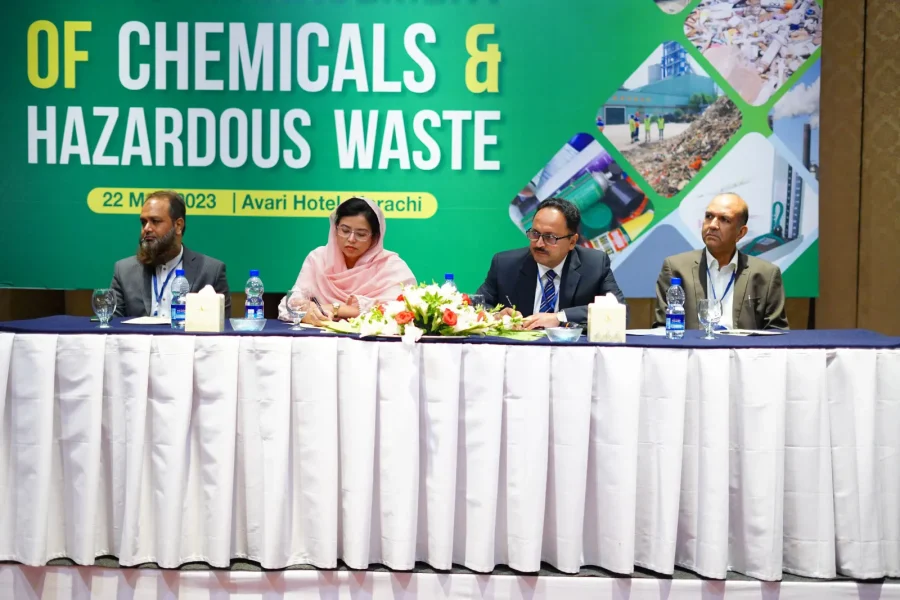The Ministry of Climate Change and Environmental Coordination, in collaboration with the United Nations Environment Programme (UNEP), organized a highly successful awareness and training workshop on chemical and hazardous waste management. The workshop, held at a local hotel in Karachi, was conducted under the UNEP funded project, “Special Programme for Strengthening of National Legislation and Capacity Building of Stakeholders for the Sound Management of Chemicals and Hazardous Waste in Pakistan.”
The workshop aimed to enhance awareness and understanding of the critical issues related to chemical and hazardous waste management in Pakistan and equip participants with the necessary knowledge and skills to address these challenges effectively.
Dr. Zaigham Abbas, Deputy Director (Chemical) at the Ministry of Climate Change and Environmental Coordination, delivered enlightening introductory remarks, shedding light on the hazardous waste and chemical issue in Pakistan. He shared the commitments of Government regarding the obligations and compliance of chemical and waste related Multilateral Environmental Agreements like Basel, Stockholm, Rotterdam, Minamata and Vienna Conventions and Montreal Protocol. He also highlighted the importance of the UNEP funded Special Programme in strengthening national legislation and building the capacity of stakeholders for sound chemical and hazardous waste management practices.
Professor Dr. Zahoor-ul-Hussain Awan from NED University captivated the audience with his presentation on the harmful impacts of hazardous waste and chemicals on the environment and human health. He highlighted the severe consequences of improper waste disposal and underscored the urgency to adopt responsible waste management practices for the sake of our environment and well-being.
Dr. Mehmood Ali shared his expertise in a session on hazardous waste introduction, properties, types, and sources. His informative presentation provided participants with a comprehensive understanding of hazardous waste, enabling them to identify, categorize, and handle such materials effectively.
Mr. Sajid Raza, Programme Technical Officer at the Ministry of Climate Change and Environmental Coordination, delivered an engaging presentation on the role of different stakeholders in sound chemicals and hazardous waste management. He emphasized the need for collaboration among government agencies, industry professionals, civil society organizations, and other stakeholders to ensure effective waste management practices throughout the entire value chain.
Ms. Bushra Afzal, National Consultant, delivered a comprehensive presentation on national regulations, guidelines, and policies for hazardous waste and chemical management. Her session provided participants with a deep understanding of the legal framework governing waste management in the country, emphasizing the importance of adherence to regulations and the significance of policy implementation.
The workshop also featured a presentation on cradle to grave management of hazardous waste and chemicals by Sajid Raza. His session emphasized the importance of adopting sustainable practices throughout the entire life cycle of hazardous materials, from production to disposal.
The participants, including government officials, industry representatives, academia, and civil society organizations, actively engaged in the workshop’s sessions and expressed a high level of sensitivity towards the issues discussed. The knowledge shared and the networking opportunities provided during the workshop are expected to contribute significantly to the improvement of chemical and hazardous waste management practices in Pakistan.
The workshop concluded with the remarks delivered by Muhammad Mureed Rahimoon, Secretary, Universities and Boards Department, Government of Sindh as Chief Guest of the Workshop. He expressed his appreciation for the active participation and insightful discussions throughout the event, emphasized the importance of environmental agreements and implementing the knowledge gained through the latest resources on chemical and hazardous waste to promote effective waste management practices in Pakistan in compliance with the Basel Convention.
The Ministry of Climate Change and Environmental Coordination extends its gratitude to UN Environment for its support and funding of the Special Programme. The success of the workshop stands as a testament to the collaborative efforts of all stakeholders involved.
The workshop marks a significant milestone in the journey towards promoting sound waste management practices in Pakistan. The Ministry of Climate Change and Environmental Coordination remains committed to further advancing the implementation of effective measures for chemical and hazardous waste management, ensuring a safer and more sustainable future for all.










